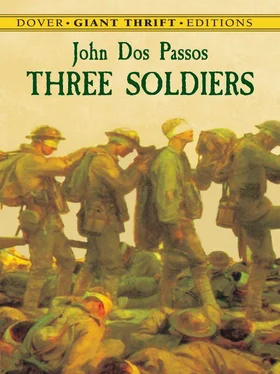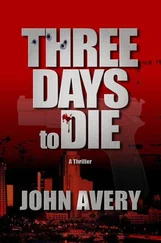“O ce pauvre poilu! Qu’il doit etre mouillé” said a small tremulous voice beside him.
He turned.
The girl was offering him part of her umbrella.
“O c’est un Americain!” she said again, still speaking as if to herself.
“Mais ça ne vaut pas la peine.”
“Mais oui, mais oui.”
He stepped under the umbrella beside her.
“But you must let me hold it.”
“Bien.”
As he took the umbrella he caught her eye. He stopped still in his tracks.
“But you’re the girl at the Rat qui Danse.”
“And you were at the next table with the man who sang?”
“How amusing!”
“Et celui-la! O il était rigolo… ” She burst out laughing; her head, encased in a little round black hat, bobbed up and down under the umbrella. Andrews laughed too. Crossing the Boulevard St. Germain, a taxi nearly ran them down and splashed a great wave of mud over them. She clutched his arm and then stood roaring with laughter.
“O quelle horreur! Quelle horreur!” she kept exclaiming.
Andrews laughed and laughed.
“But hold the umbrella over us… You’re letting the rain in on my best hat,” she said again.
“Your name is Jeanne,” said Andrews.
“Impertinent! You heard my brother call me that… He went back to the front that night, poor little chap… He’s only nineteen… he’s very clever… O, how happy I am now that the war’s over.”
“You are older than he?”
“Two years… I am the head of the family… It is a dignified position.”
“Have you always lived in Paris?”
“No, we are from Laon… It’s the war.”
“Refugees?”
“Don’t call us that… We work.”
Andrews laughed.
“Are you going far?” she asked peering in his face.
“No, I live up here… My name is the same as yours.”
“Jean? How funny!”
“Where are you going?”
“Rue Descartes… Behind St. Etienne.”
“I live near you.”
“But you mustn’t come. The concierge is a tigress… Etienne calls her Mme. Clemenceau.”
“Who? The saint?”
“No, you silly-my brother. He is a socialist. He’s a typesetter at l’Humanité.”
“Really? I often read l’Humanité.”
“Poor boy, he used to swear he’d never go in the army. He thought of going to America.”
“That wouldn’t do him any good now,” said Andrews bitterly. “What do you do?”
“I?” a gruff bitterness came into her voice. “Why should I tell you? I work at a dressmaker’s.”
“Like Louise?”
“You’ve heard Louise? Oh, how I cried.”
“Why did it make you sad?”
“Oh, I don’t know… But I’m learning stenography… But here we are!”
The great bulk of the Pantheon stood up dimly through the rain beside them. In front the tower of St. Etienne-du-Mont was just visible. The rain roared about them. “Oh, how wet I am!” said Jeanne.
“Look, they are giving Louise day after tomorrow at the Opera Comique… Won’t you come with me?”
“No, I should cry too much.”
“I’ll cry too.”
“But it’s not… ”
“C’est l’armistice,” interrupted Andrews.
They both laughed!
“All right! Meet me at the café at the end of the Boul’ Mich’ at a quarter past seven… But you probably won’t come.”
“I swear I will,” cried Andrews eagerly.
“We’ll see!” She darted away down the street beside St. Etienne-du-Mont. Andrews was left alone amid the seethe of the rain and the tumultuous gurgle of waterspouts. He felt calm and tired.
When he got to his room, he found he had no matches in his pocket. No light came from the window through which he could hear the hissing clamor of the rain in the court. He stumbled over a chair.
“Are you drunk?” came Walters’s voice swathed in bedclothes. “There are matches on the table.”
“But where the hell’s the table?”
At last his hand, groping over the table, closed on the matchbox.
The match’s red and white flicker dazzled him. He blinked his eyes; the lashes were still full of raindrops. When he had lit a candle and set it amongst the music papers upon the table, he tore off his dripping clothes.
“I just met the most charming girl, Walters,” Andrews stood naked beside the pile of his clothes, rubbing himself with a towel. “Gee! I was wet… But she was the most charming person I’ve met since I’ve been in Paris.”
“I thought you said you let the girls alone.”
“Whores, I must have said.”
“Well! Any girl you could pick up on the street… ”
“Nonsense!”
“I guess they are all that way in this damned country… God, it will do me good to see a nice sweet wholesome American girl.”
Andrews did not answer. He blew out the light and got into bed.
“But I’ve got a new job,” Walters went on. “I’m working in the school detachment office.”
“Why the hell do that? You came here to take courses in the Sorbonne, didn’t you?”
“Sure. I go to most of them now. But in this army I like to be in the middle of things, see? Just so they can’t put anything over on me.”
“There’s something in that.”
“There’s a damn lot in it, boy. The only way is to keep in right and not let the man higher up forget you… Why, we may start fighting again. These damn Germans ain’t showin’ the right spirit at all… after all the President’s done for them. I expect to get my sergeantcy out of it anyway.”
“Well, I’m going to sleep,” said Andrews sulkily.
* * *
John Andrews sat at a table outside the café de Rohan. The sun had just set on a ruddy afternoon, flooding everything with violet-blue light and cold greenish shadow. The sky was bright lilac color, streaked with a few amber clouds. The lights were on in all the windows of the Magazin du Louvre opposite, so that the windows seemed bits of polished glass in the afterglow. In the colonnade of the Palais Royal the shadows were deepening and growing colder. A steady stream of people poured in and out of the Metro. Green buses stuffed with people kept passing. The roar of the traffic and the clatter of footsteps and the grumble of voices swirled like dance music about Andrews’s head. He noticed all at once that the rabbit man stood in front of him, a rabbit dangling forgotten at the end of its rubber tube.
“Et ça va bien? le commerce,” said Andrews.
“Quietly, quietly,” said the rabbit man, distractedly making the rabbit turn a somersault at his feet. Andrews watched the people going into the Metro. “The gentleman amuses himself in Paris?” asked the rabbit man timidly.
“Oh, yes; and you?”
“Quietly,” the rabbit man smiled. “Women are very beautiful at this hour of the evening,” he said again in his very timid tone.
“There is nothing more beautiful than this moment of the evening… in Paris.”
“Or Parisian women.” The eyes of the rabbit man glittered.
“Excuse me, sir,” he went on. “I must try and sell some rabbits.”
“Au revoir,” said Andrews holding out his hand.
The rabbit man shook it with sudden vigor and went off, making a rabbit hop before him along the curbstone. He was hidden by the swiftly moving crowds.
In the square, flaring violet arclights were flickering on, lighting up their net-covered globes that hung like harsh moons above the pavement.
Henslowe sat down on a chair beside Andrews.
“How’s Sinbad?”
“Sinbad, old boy, is functioning… Aren’t you frozen?”
“How do you mean, Henslowe?”
“Overheated, you chump, sitting out here in polar weather.”
“No, but I mean… How are you functioning?” said Andrews laughing.
Читать дальше












